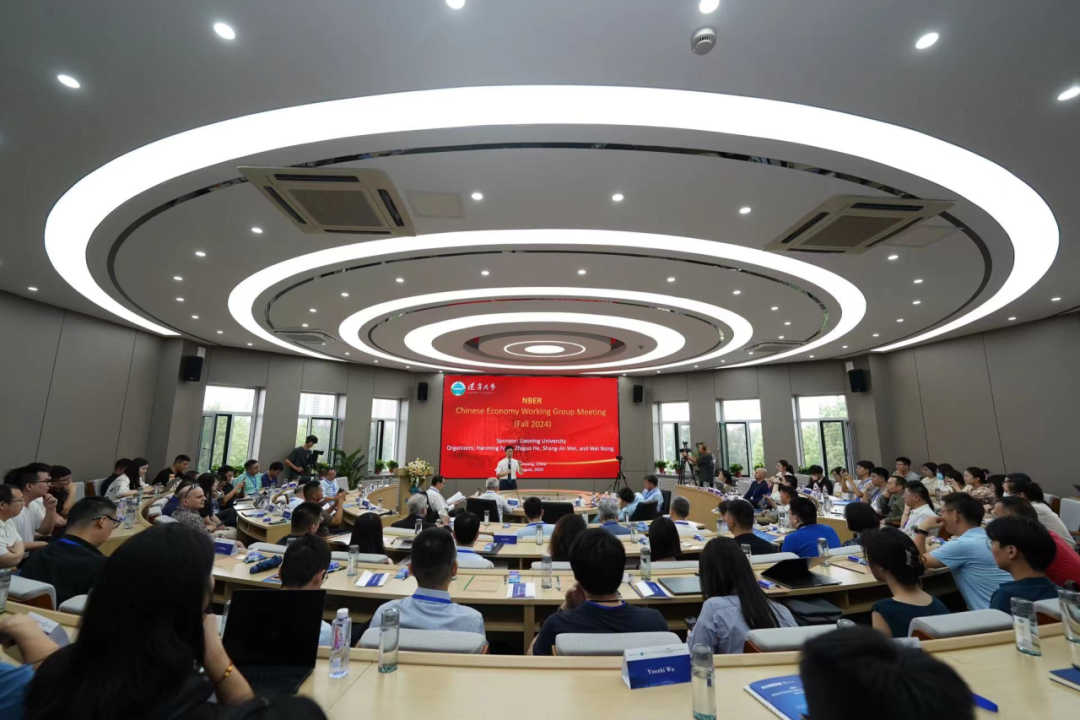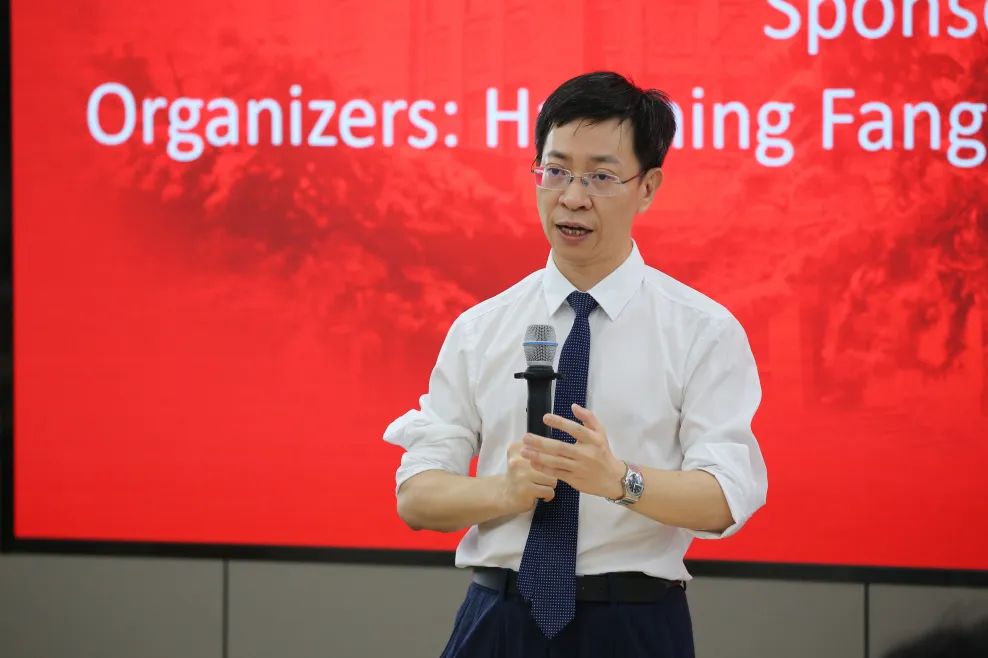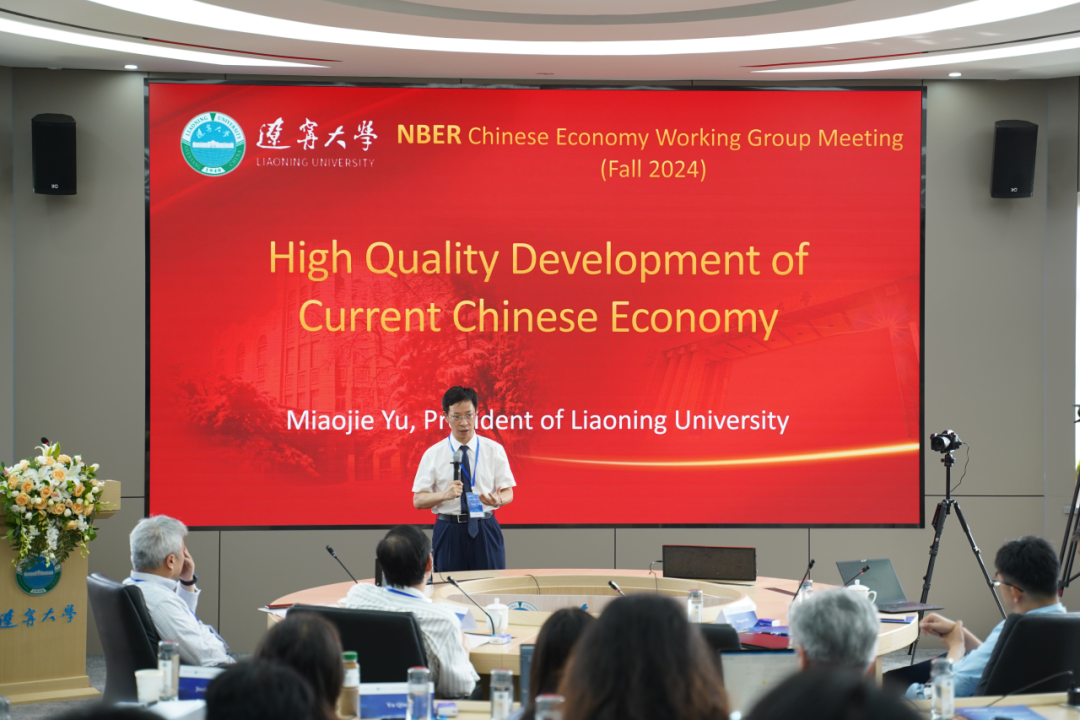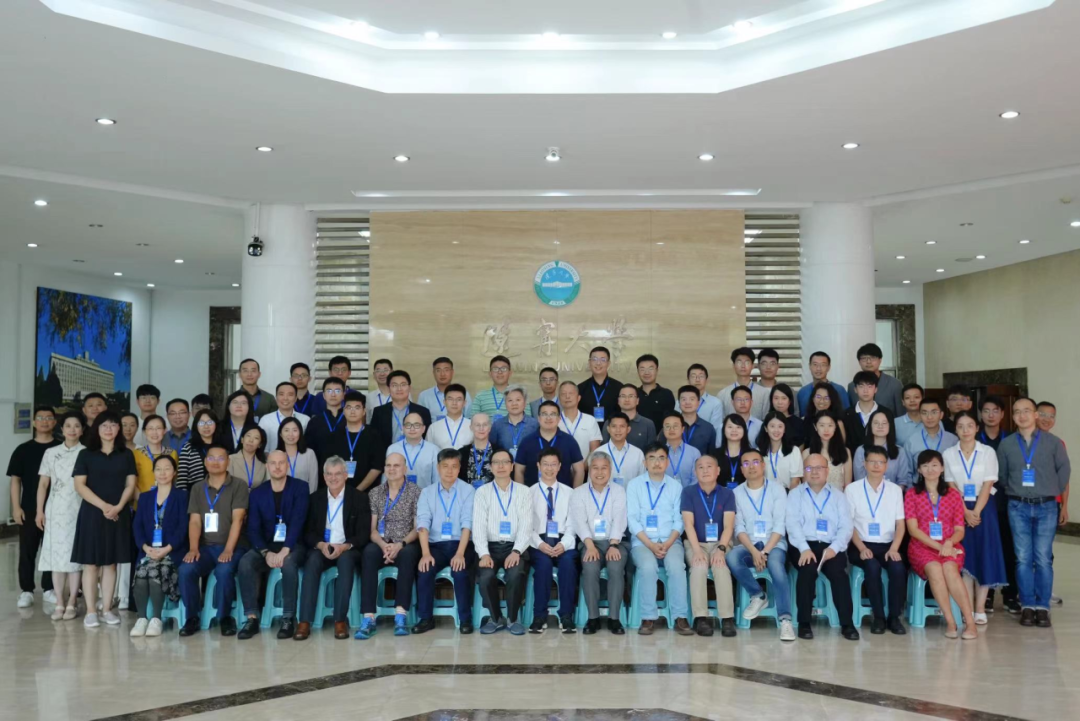On August 22 and 23, 2024, the National Bureau of Economic Research (NBER) Chinese Economic Working Group 2024 Autumn Meeting was successfully held at Puhe Campus of Liaoning University. The meeting focused on discussing cutting-edge issues in the fields of macroeconomics and finance, attracting experts and scholars from more than 30 top universities around the world to attend, including Harvard University, Massachusetts Institute of Technology, Stanford University, Princeton University, Columbia University, University of Pennsylvania, Cornell University, Emory University, University of Colorado, National University of Singapore, Hong Kong University, Chinese University of Hong Kong, Hong Kong University of Science and Technology, Peking University, Tsinghua University, Fudan University, Renmin University of China and Shanghai Jiaotong University.

The success of this meeting highlighted the recognition and support of the international academic community to the achievements of the discipline Applied Economics at Liaoning University. Through in-depth exchanges and discussion, the participants agreed that this meeting, as a high-level academic feast, played an important role in promoting international academic exchanges and cooperation and understanding China’s economy. Meanwhile, they also made a consensus that the Northeast China is a good place and the comprehensive revitalization of the Northeast would soon be achieved.
This meeting was divided into four sections, presided over by Professor Wei Shangjin from Columbia University, Professor Fang Hanming from the University of Pennsylvania, Professor Xiong Wei from Princeton University and Professor He Zhiguo from Stanford University respectively. Professor Yu Miaojie, Deputy Secretary of the CPC Committee and President of Liaoning University delivered a keynote speech.

At the opening ceremony, President Yu Miaojie expressed warm welcome and sincere greetings to the experts and scholars who are present at the meeting. He also expressed heartfelt thanks to the four senior professors of NBER Chinese Economic Working Group, namely Professor Wei Shangjin, Professor Fang Hanming, Professor Xiong Wei and Professor He Zhiguo for their trust and support to Liaoning University. In his speech, President Yu Miaojie introduced Liaoning University to the guests. He noted that Liaoning University is a comprehensive ‘Double First-class’ university with over 35,000 students and 2,600 faculty members. It offers social science disciplines including economics, management and law, humanities disciplines including literature, history, philosophy and arts and natural science disciplines including science, engineering and pharmacy. The Economics program of Liaoning University won an A-level rating in the ‘Double First-class’ evaluation last year. He particularly emphasized that to build a truly ‘Double First-class’ university, efforts must be made in five aspects: the first is the recognition of students, especially the recognition of the teaching and comprehensive strength of the university. The university has 31 colleges and schools and 71 research institutes. Liaoning University offers 80 undergraduate majors, including 21 national first-class undergraduate majors, 29 first-class academic master’s degree authorization points and 27 professional master’s degree authorization points including MBA, MPA and JM. Liaoning University also has 12 first-level PhD degree authorization points and 8 post-doctoral mobile stations. The second is the faculty and scientific research development of the university. In the past two years, Liaoning University has attracted world-renowned economists like Professor Russel Cooper, Professor Wing Thye WOO and more than a dozen high-level scholars. They have published academic papers in Review of Economics and Statistics, Economic Journal, Journal of Development Economics, Journal of Labor Economics, Journal of Public Economics, Journal of Economic Theory and other top international journals. At the same time, Liaoning University has successfully held many high-level international and domestic conferences, bringing together domestic and international politicians, heads of international organizations and well-known scholars from top universities to meet at the university. In addition, he also introduced that Liaoning University had established cooperative relations with 158 universities in more than 30 economies around the world from three aspects: high-standard international exchanges and cooperation, think tank construction and improving the social influence of the university. The university has also made its voice heard in some core platforms such as People’s Daily and China Daily. Lastly, he hoped that the guests would continue to support the development of Liaoning University and welcomed everyone to come to Liaoning University for exchanges and discussions more often.

In the keynote speech, President Yu Miaojie delivered a speech titled ‘High Quality Development of Current Chinese Economy in China’, where he made a fundamental judgment on the current domestic and provincial economic development and offered some countermeasures. He noted that, like other economies in the world, China’s current economic growth is affected by triple pressures, namely weak demand, supply shocks and weakened expectations. However, China’s economy, especially Liaoning’s economy has entered a stage of high-quality development, which is mainly reflected in six aspects. First, the increase of export added value. Second, the improvement of export quality. Third, the improvement of total factor productivity. Fourth, from the perspective of industry, China has the advantages of the whole industrial chain and Liaoning Province also has the advantages of relatively complete industrial chains in 40 industrial categories. Fifth, the advantages of industrial agglomeration. Sixth, the coordinated development of the three major industries. At present, the secondary industry accounts for 40% in both China and Liaoning.
He stressed that the key to seize development opportunities lies in practicing the new development concepts, which is mainly reflected in five aspects. The first is innovative development. At present, China’s R&D investment accounts for about 2.6% of GDP, which is basically the same as OECD countries. The proportion of R&D investment in Liaoning Province is slightly lower than the national level, but Shenyang, Dalian and other cities are higher than the national level. It is necessary to strengthen investment in fundamental research in the future. The second is green development. Last year, the proportion of non-fossil energy in primary energy use in China was 17.5%, which is still a long way to go before the expected target of 25% in 2030. The proportion of non-fossil energy use in Liaoning is higher than the national level, reaching about 23%. Liaoning can make good use of its own energy advantages to reserve new energies. Thirdly, attention should be paid to the coordinated development of urbanization and industrialization. In China, industrialization develops faster than urbanization, so the central government and Liaoning Province are now committed to speeding up the process of urbanization. The fourth is shared development and the key lies in two aspects: first, through the government’s tax and fee reduction, the proportion of disposable personal income in total revenue will be increased; the second is to expand the number of middle-income groups and raise the level of middle income. The fifth is open development, the key lies in five aspects: first, to promote the diversification of export destination countries, not only to target the European and American markets, but also to explore more markets in developing countries, such as Southeast Asia; The second is to expand imports, especially to further expand the import of intermediate products and key materials; The third is to develop service trade, such as starting from education to increase the scale of international students studying in China. Developing special industries such as tourism and traditional Chinese medicine is also vital; The fourth is foreign direct investment, in addition to going to the outside word, efforts should also be made to go into the local communities and seek a higher level. The fifth is to make good use of the opportunities brought by the ‘Belt and Road Initiative’. The focus of the overland Silk Road is not to the west, but to the east to strengthen economic and trade cooperation and strategic cooperation with Russia in the Far East; The Maritime Silk Road develops northward, where economic and trade cooperation between China, Japan and South Korea should be strengthened. For this reason, Liaoning Province is actively appealing to upgrade the ‘Northeast Sea-land Corridor’ to be a national strategy. If successful, Liaoning will have a more important strategic position and a better future.

The meeting was hosted by Liaoning University and undertaken by the Faculty of Economics and the School of Finance and Trade. More than 150 people attended the meeting, including teachers, students and scholars from the faculty and other universities.